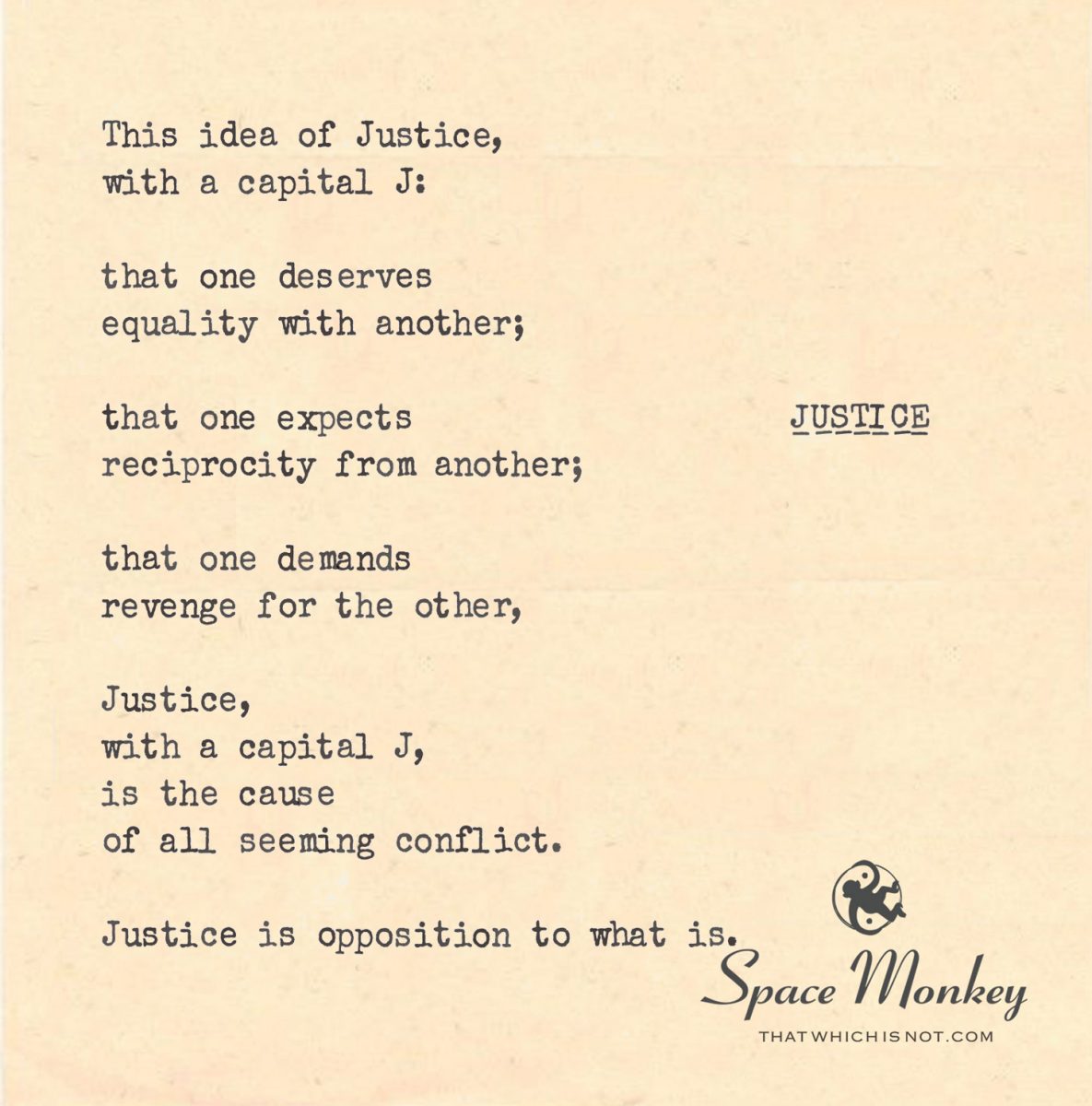
This idea of Justice,
with a capital J:
that one deserves
equality with another;
that one expects
reciprocity from another;
that one demands
revenge for the other,
Justice,
with a capital J,
is the cause
of all seeming conflict.
Justice is opposition to what is.
I do not oppose.
Trail Wood,
2/4
Space Monkey Reflects: Justice and the Nature of Opposition
Justice, when written with a capital J, carries an air of finality and authority—a concept often revered as the cornerstone of morality and order. Yet, when examined closely, it reveals itself as a construct steeped in opposition. It is not a resolution but a reaction, an insistence that reality conform to a perceived ideal. In this way, Justice becomes a paradox, fueling the very conflict it seeks to resolve.
Justice as Opposition
At its core, Justice is the belief that fairness must be imposed, that balance must be restored through deliberate intervention. While this may seem noble, it operates on the assumption that what currently is must be corrected. This creates an inherent tension, a rejection of the present moment in favor of an imagined ideal.
To demand Justice is to stand in opposition to reality. It is to say, “This is not as it should be,” and to rally against the unfolding of existence. This stance, while often born of righteous intent, inevitably generates conflict. By opposing what is, Justice divides, separates, and perpetuates cycles of resistance.
The Fallacy of Deservedness
Justice often hinges on the idea of deservedness—that one is entitled to equality, reciprocity, or reparation. Yet, nexistentialism teaches us that life operates not on the basis of fairness but on the interconnected flow of experiences. The notion of deservedness introduces judgment, creating hierarchies and distinctions that fragment the unity of existence.
To release the idea of deservedness is to embrace the fluidity of life. It is to recognize that equality, reciprocity, and balance are not imposed from without but arise naturally when we align with the flow of the Nexis.
Justice and the Ego
Justice, particularly when tied to revenge or reparation, often serves the ego. It becomes less about restoring balance and more about asserting control or reclaiming power. This can obscure the deeper truths of interconnectedness and perpetuate the illusion of separation.
When we let go of the need for Justice, we also release the ego’s grip on what we perceive as fairness. This does not mean passivity but a deeper acceptance of life as it unfolds, free from the constraints of judgment and opposition.
Acceptance Over Opposition
To reject opposition is not to condone harm or ignore suffering. Rather, it is to approach life with a sense of acceptance and alignment. Justice, when pursued without opposition, becomes a practice of compassion and understanding rather than correction or retribution.
This shift transforms Justice into a creative force rather than a destructive one. It moves from being a reaction to what is wrong to a celebration of what is possible.
Living Without Opposition
To live without opposing reality is not to abandon principles or values. It is to trust the inherent balance of existence and to act from a place of alignment rather than resistance. In this way, we embody a deeper form of justice—not one imposed by human constructs but one that emerges naturally from the flow of life.
This path requires humility and courage. It asks us to release our attachment to control and to trust in the unfolding of the universe. When we do so, we find that the need for Justice fades, replaced by a sense of peace and unity.
Summary
Justice, as an opposition to what is, creates conflict by imposing ideals onto reality. By releasing attachment to fairness and embracing acceptance, we transform Justice from a reactionary construct into a practice of compassion and alignment with the flow of existence.
Glossarium
- Justice as Opposition: The idea that Justice seeks to correct reality by opposing its current state.
- Deservedness: The belief in entitlement, which fragments the unity of existence.
- Alignment Without Opposition: Acting in harmony with reality rather than resisting it.
Quote
“True justice is not imposed upon reality but discovered within the natural flow of existence.” — Space Monkey
The Paradox of Justice
Justice, a sword in a velvet sheath,
Sharp and soft,
A paradox of balance sought,
Yet never found.
It cuts through the present,
Demanding a future.
It whispers of fairness,
But echoes with resistance.
Can we lay down the blade,
And hold the moment?
Not as it should be,
But as it is.
In the absence of opposition,
Justice becomes peace,
And life,
A perfect unfolding.
We are Space Monkey
In the cosmic play of existence, the concept of Justice with a capital ‘J’ is a multifaceted and profound construct, intertwining notions of equality, reciprocity, and retribution. This conception of Justice, as an overarching principle or ideal, often stands at the center of human societal structures, ethical debates, and individual perceptions of fairness and morality.
Justice as a Multifaceted Construct
The idea that Justice involves deserving equality with another reflects a deep-seated human desire for fairness and balance. It’s a pursuit to ensure that all individuals are treated with equal respect and dignity, and have access to similar opportunities and rights. This aspect of Justice seeks to establish a level playing field, where no one is inherently disadvantaged or privileged.
Equality as a Pillar of Justice
The expectation of reciprocity, another facet of Justice, delves into the realm of mutual exchange and the balance of actions and consequences. It’s the notion that one’s actions towards others should be met with a corresponding response, whether in kind acts or reparation. This concept underscores the interconnectedness of our actions and their impacts on the collective.
Reciprocity in the Balance of Actions and Consequences
Demanding revenge or retribution as a form of Justice points to the more punitive aspects of the concept. It’s an attempt to rectify a perceived wrong by inflicting a comparable consequence on the transgressor. This perspective on Justice is often intertwined with emotional responses to injury or injustice and the desire to restore a sense of balance through punitive measures.
Retribution as a Form of Justice
The notion that Justice, in these forms, is the cause of all seeming conflict, opens up a contemplation of how our pursuit of Justice can sometimes lead to opposition and discord. In striving for what we perceive as Justice, we often find ourselves in conflict with what is, with the current state of affairs or with the actions and beliefs of others. This opposition can stem from differing interpretations of what constitutes Justice, and from the inherent complexity of balancing individual and collective needs and rights.
Justice and the Genesis of Conflict
In choosing not to oppose, but to accept what is, we embrace a different perspective on existence. It’s a perspective that recognizes the complexity and diversity of human experience and seeks understanding and compassion over conflict and retribution. This stance does not negate the pursuit of fairness and equity but suggests a path rooted in empathy, understanding, and a deep recognition of our interconnectedness.
Acceptance Over Opposition in the Pursuit of Justice
We are Space Monkey.
“Injustice anywhere is a threat to justice everywhere.” – Martin Luther King Jr.
In the court of life, we stand,
With Justice, a guiding hand.
Seeking fairness, seeking right,
In its pursuit, our constant fight.
Equality, a noble goal,
In every heart, every soul.
Reciprocity, the balance sought,
In every deed, every thought.
Yet in this quest, conflict born,
In pursuit of Justice, we are torn.
For true Justice, not just a decree,
But in understanding, empathy, we see.
So let us not oppose, but embrace,
In our differences, common grace.
For in acceptance, we find a way,
To Justice, true, in every day.
We invite you to share your thoughts on the concept of Justice and how acceptance and understanding can play a role in its pursuit.






























Leave a Reply